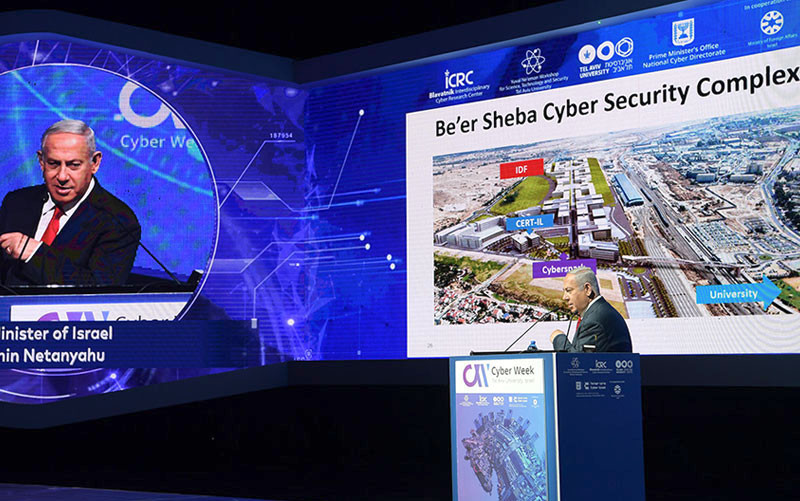Is Israel set for cyber-vote threat?
As Israeli elections approach, the country’s cybersecurity watchdogs are warning about attempts by foreign actors to disrupt and manipulate the democratic process.
The issue came to the fore earlier in January, when the head of the Shin Bet domestic intelligence agency, Nadav Argaman, reportedly told a closed-door conference that a “foreign state is planning to intervene in the elections. I don’t know at this stage in favor of whom or at whose detriment,” the intelligence chief said, adding, “I know what I’m talking about.”
Thought Argaman did not mention it by name, Russia responded days later that Moscow does not intervene in the elections of other countries, and advised others to refrain “from reading the Israeli media.”
Meanwhile, Israel’s intelligence community, together with the Foreign Ministry, the National Cyber Directorate and private cyber defense firms, are preparing to repel foreign intervention.
But the way state agencies have worked until now needs to change, according to Eli Bachar, a former legal adviser to the Shin Bet. He recently completed an in-depth study with colleague Ron Shamir, former head of the Technological Branch of the Shin Bet.
The study, carried out with the Israel Democracy Institute and the Cyber Security Center of the Hebrew University of Jerusalem, examined the critical question of how democratic states can defend themselves against this growing threat.
“We took all of the attacks that occurred in recent years, in the US and Europe, drew lessons from them, and then made recommendations,” Bachar told JNS.
The study identified three main spheres of action: election process, political parties and actors, and influencing public opinion.
Israel uses paper ballots, making it less vulnerable to foreign meddling, said Bachar. But computer systems still surround the process, and those “have to be defended against forgery, disruption or denial of access attacks.” Voter lists and computers used by Israel’s Central Elections Committee need to be secured, he added.
The world of political parties and figures “is much more problematic,” he stated. “In the US, we saw break-ins into Democratic and Republic computers. We saw email accounts hacked. In general, it is very important to defend the many things we want as democracies to function, such as elections strategies, supporters list and message promotion.”
All primary elections within political parties are computerized, but unsupervised, so a gap exists for advanced attackers.
When it comes to the sphere of public opinion, Bachar said, “this whole area is breached.” Bots, trolls and micro-targeting of voters via social media are all used by manipulators around the world, and have begun to appear in Israeli social media as well.
“This is a world that is much harder to defend,” said Bachar. “It requires online supervision, but as a democracy, you do not want to give that job to state security services. This is a conceptual challenge.”
Israel must guard the public’s trust in the elections, emphasized Bachar, describing this as the prime goal. The report’s recommendations include calling for new legislation, which would require political parties to allocate a percentage of their budget to cyber defense. “Otherwise, we know the parties will use their money for other things that are more urgent to them, like elections messages and conference,” he said.
In addition, the report recommends that elections be defined by Israeli law as a “critical infrastructure,” which will make new levels of protection available. All political ads and messages should be required to inform the public which political body stands behind them, the report said.
It also called for the Central Elections Committee, rather than the Prime Minister’s Office, to take the lead in responding to cyber-attacks during an elections season.
The organizations defending the elections should be subordinate to the Elections Committee, Bachar argued, since the committee chairman is a High Court judge — a non-political figure. “This way, the organizations will not receive orders from the prime minister, who is a political actor, regardless of which prime minister this is. We want to make sure that the medicine is not worse than the disease,” he said.
While the US intelligence community has named Russia as being behind attempts to influence American elections, and similar accusations have surfaced in France and Germany, Bachar noted that US National Security Advisor John Bolton also recently named China, North Korea and Iran as threats.
“Non-state organizations that are sophisticated can do this, too. Therefore, it is best to look at this broadly and not just in terms of one potential adversary,” he said.
Israel is particularly vulnerable, he cautioned, because of tensions between Jews and Arabs, right and left, and religious and secular. In fact, he said, “Israel is more sensitive to such attacks compared to more homogenous societies.”
“There is an attempt underway to influence public opinion,” said Ran Margaliot, CTO of Communit360, which allows Israeli journalists to report suspicious online activity and the promotion of fake news. “In which direction — that is open to interpretation.”

 48.0°,
Light Rain
48.0°,
Light Rain 




